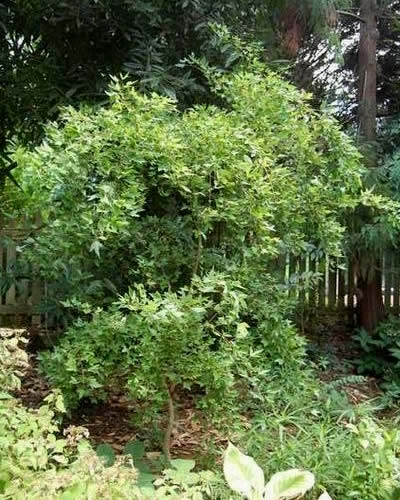Angyo Weeping Trident Maple |
|
|
Sapindaceae Acer Buergerianum Angyo Weeping |
|
| Price |
|
| Availability and Options |
Temporarily Out Of Stock This product is temporarily out of stock. Restocks typically occur at the beginning of each week. Check back soon and sorry for the inconvenience! |
| Shipping Information | |
| Grows In | Zone 5A · -20° to -15° F through Zone 8B · 15° to 20° F |
| Sun Exposure | Full / Mostly Sun, Morning Sun / Evening Shade, Morning Shade / Evening Sun |
| Soil Drainage | Well Drained |
| Resistent To | Deer Resistant |
| Blooms | Fall Foliage |
| Foliage Color | Burgundy, Orange, Medium Green |
| Average Height | 12' to 15' |
| Average Width | 8' to 10', 10' to 15' |
| Attracts | Visual Attention |

'Angyo Weeping' is an exciting new pendulous selection of trident maple that brings a whole new twist to this wonderful and underutilized species. The strong growing tree develop an arching framework of elegant, cascading stems that add a fountain like presence to the garden. Lush green three-lobed leaves transform to silky orange and burgundy tones in autumn. The ultimate size is still unknown yet we suspect plants are capable of reaching 12-15 feet in height.
Plant Angyo Weeping Trident Maple in a location that provides well-drained but moist soil and full sun to part shade.
Angyo Weeping Trident Maple is an easy to grow tree that requires very little if any pruning. When young, it may help to stake the tree to train it to have a more upright habit of growth.
When provided the right environment in the landscape Japanese Maples are very easy to grow and care for, and long lived.
Soil - Japanese maples adapt well to many soil types provided there is good drainage. Consistently wet or soggy soils can be a killer.
Sun - Some varieties will tolerate full sun. However, in their natural habitat, Japanese Maples are understory trees, growing in dappled forest sunlight and at the edges of partially shaded woodlands. Ideally they prefer to be grown in similar conditions, especially in the warmer climate of the Deep South.
Pruning - When a specific variety of Japanese maple is planted in the right size space; where it have room to grow to mature size, rarely will it require pruning. That beings said, removal of damaged or stray branches that spoil the form of the tree can be performed almost any time of year. Heavy or major pruning is best left to professionals. If you hire someone to prune your Japanese maple make sure he/she has the credentials and ALWAYS check references.
Water - During the first two summers after planting a Japanese Maple, make sure to water enough to keep soil damp but not soggy. Constantly wet feet can cause serious problems. Proper planting method can ensure proper drainage over the long term.
SEE: Detailed Planting Instructions For How To Plant A Japanese Maple in the Ground